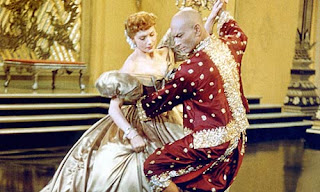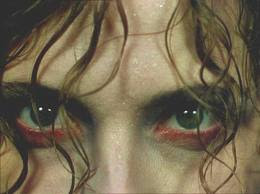 |
| Montgomery Clift as Robert E. Lee Prewitt. |
 Holmes is a sorry officer, who relies on his efficient staff sergeant, Sergeant Warden (Burt Lancaster), to keep the company running smoothly while he focuses his efforts on securing an undeserved promotion. A classic case of the Peter Principle, Holmes has risen above his ability. We learn early that he cheats on his wife, neglecting her as he chases other women and drinks at the officers' club.
Holmes is a sorry officer, who relies on his efficient staff sergeant, Sergeant Warden (Burt Lancaster), to keep the company running smoothly while he focuses his efforts on securing an undeserved promotion. A classic case of the Peter Principle, Holmes has risen above his ability. We learn early that he cheats on his wife, neglecting her as he chases other women and drinks at the officers' club. The film is based on James Jones' bestselling novel, and director Zinnemann wisely focused on three relationships in transferring the story from page to screen. The most interesting involves Warden's affair with Holmes' wife, Karen (Deborah Kerr). Warden also serves as somewhat of a mentor to Prewitt, giving the stubborn private advice and keeping him off report when he goes AWOL. A second, parallel love affair involves Prewitt and Lorene (Donna Reed), a girl-next-door type he meets at a social club. To appease censors, film-makers changed Lorene's occupation from the novel, where it's clear she's a prostitute. And Zinnemann dropped a subplot from the novel that concerned soldiers and gay locals who frequented the bars, as well as a long section that had Prewitt in the stockade. The final relationship involves Prewitt and Maggio's (Frank Sinatra) friendship. Maggio's short temper and wise-cracking gets him in trouble.
Admirers of the film praise Clift's performance, which is terrific; but for me, the best part of the film are the scenes with Lancaster and Kerr. Both seem credible and natural, especially Kerr as the adulterous wife, vulnerable and hurt and troubled by rumor and gossip. Their first scene is innocent enough and takes place as Kerr comes to the office looking for her husband. Warden tells Karen he's out, but there's an undercurrent of sexual attraction between the two. Later, he comes to her house in a rain storm under the pretext of official business.
Warden brings papers to Holmes' house for his signature, knowing that only his wife would be there]
Karen: Are these really important?
Sergeant Warden: Yes, but not important they get signed today. Tomorrow's okay.
[She rips them up]
Warden: I have copies at the office, so it won't be much work to fix 'em up.
Karen: That's what I like about you, Sergeant: you have confidence. It's also what I dislike about you.
Warden: It's not confidence, ma'am; it's honesty. I just hate to see a beautiful woman going all to waste.
Karen: Waste, did you say? There's a subject I might tell you something about. I know several kinds of waste, Sergeant. You're probably not even remotely aware of some of them. Would you like to hear? For instance, what about the house without a child? There's one sort for you. Then there's another... You're doing fine, Sergeant. My husband's off somewhere, and it's raining outside, and we're both drinking now. You've probably only got one thing wrong. The lady herself. The lady's not what she seems. She's a... washout, if you know what I mean... and I'm sure you know what I mean!
Warden: You going to cry?
Karen: Not if I can help it. What are you doing?
Warden: I'm leaving. Isn't that what you want?
Karen: I don't know, Sergeant. I don't know.
[He kisses her]
It's a beautifully acted scene. Kerr captures a complex mix of emotions with nervous glances and body language. This virile man excites her, but we suspect she's been burnt before by men who have used her; she's scared and unsure of herself. Most of all she is achingly lonely and unhappy in her loveless marriage. Presumably, this encounter leads to their first tryst.
 |
| Sergeant Warden and Karen Holmes share a last meeting. |
 |
| The famous kiss. |
Here, Warden acts somewhat cruelly, almost taunting her about her past, having heard salacious lies about her being with several other men. She shares her sad story, about her philandering husband, her lost child, and her inability to have another.
There's another scene later in a secluded night club, where they sit quietly together as a band plays tropical music. Karen isn't really listening, just gazing at this wonderful man who promises her a new life, one with love and caring. Zinnemann uses one of the rare closeups in the film to track to Kerr's face. Watch her eyes. She kisses his wrist and buries her face in Lancaster's neck. But the illicit romance is ill-fated, as circumstances are against them. (To emphasize the impermanence of it all, the only time Karen uses the sergeant's given name is in their last meeting.)
A six-time nominee for Best Actress, Kerr never won. Timing has a lot to do with it as each time she was up against some tough competition, but 1953 may have been her best chance. She lost to lovely Audrey Hepburn for Roman Holiday. I'd of voted for Kerr.
Interestingly, Joan Crawford was to play the role until a dispute over who would serve as cameraman got her sent packing. She and Lancaster would have smoldered. But director Zinnemann went with Kerr in an inspired bit of casting against type. Perhaps to enhance the effect, he had her gorgeous red hair dyed blond. She gives a passionate performance and looks great, even in black and white, but here's a photo of her as Karen in color:
This is Lancaster's first big role and he's perfect. One man describes Warden as the best soldier he's ever seen and in early scene Lancaster appears shirtless. Age 39 at time of filming, Lancaster was cut, with a physique any athlete would envy. He'd been acting successfully for seven years, but never had had such a meaty role. Ernest Borgnine is great as "Fatso" Judson, a dangerous sergeant who runs the stockade and dishes out punishment with his fists. He's more sadistic in the novel, but Borgnine makes the character plenty scary in the film. Maggio gets on his wrong side and suffers the consequences. Judson also carries a switch blade, which he is only too happy to unleash. The most exciting scene in the film has him threatening Maggio in an altercation in a bar. Warden breaks it up by smashing a beer bottle and jumping between the two combatants. Maggio isn't so lucky later when he finds himself in the stockade.
 |
| O.K. Fatso, if it's killin' ya want, come on. |
As good as parts are, the film has problems. The story loses steam any time it returns to Prewitt and Lorene. This is likely the fault of the script and the source novel, which gives the couple a less compelling story. And the actual Japanese attack is not impressive. Viewers expecting lots of explosions and action will be disappointed. There are a few token stock footage shots of the harbor attack on the Naval ships, including the explosion on the battleship Arizona, but most involves just the strafing of Schofield Barracks and Lancaster and crew attempting a feeble return fire.
Overall, the film received 13 Oscar nominations, and won 8, including Best Film and Best Director. Besides Kerr, Lancaster and Clift were both nominated for Best Actor. They likely cancelled each other out and the award went to William Holden for Stalag 17. Both Sinatra and Reed took home supporting statues, but neither are that impressive. Sinatra in particular did far better work elsewhere. The dramatic role by the singer likely was so unexpected that Academy voters gave him the award. Reed's best scene takes place at the end. She and Karen happen to be on the same ship, headed back to the states. (No one here gets a happy ending except Warden, a career military man who's likely content that the expectant war has finally started.)
Lorene fabricates a story about Prewitt to impress Karen, and as a way to handle her grief -- he's been shot trying to get back to his troop following the bombing. She says he was a pilot, killed while trying to take off during the attack, but Karen knows different, having heard about the private from Warden. Karen tosses two leis into the water, saying if they float back to shore, you will return to Hawaii some day, and if out to sea, you will never be back. Lorene says she'll never come back, but we are left wondering what will become of Karen. She's opted to remain with Holmes after concluding she and Warden are too different, but it's hard to think her decision as final. After the war, who knows...?
 |
| Which way will the leis float? |
The New York Times loved the film, saying: "As a job of editing, emending, re-arranging and purifying a volume bristling with brutality and obscenities, "From Here to Eternity" stands as a shining example of truly professional moviemaking."

























